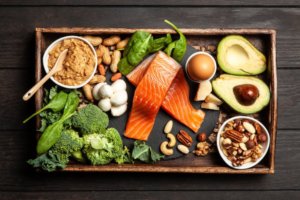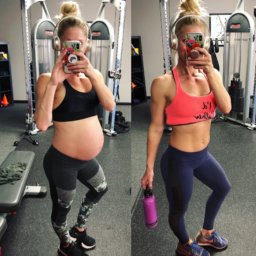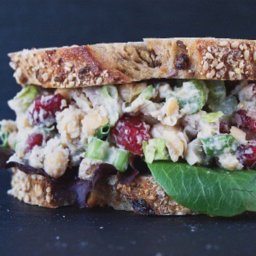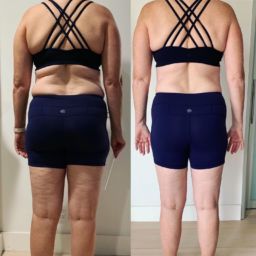The ketogenic diet is one of the fastest growing diets and weight loss trends.
Fun Fact: Did you know the Keto diet was developed for treatment of epilepsy in 1920? It can be very effective in preventing seizures, under medical supervision.
What Is the Ketogenic Diet?
Many people say they are “keto” because they choose “keto-friendly” snack foods, desserts, or don’t eat pasta or bread. However, a true ketogenic diet is extremely low in carbohydrates, usually less than 30 grams per day, or about 10% of calories. Its similar to the Atkin’s diet, which became popular back in the 70s. Unlike the Atkin’s diet, which was high in protein, the keto diet tends to be higher in fat, up to 80% of calories.
When you eat little carbs, it forces your body into a state of ketosis. Instead of using glucose (sugar) from your food or glycogen from your muscle, your body will turn fat into an alternate source of energy called ketones. The body also has a way of turning amino acids from protein into glucose for those tissues and organs that can’t utilize ketones.
Will You Lose Weight On The Keto Diet?
Yes, you will lose wight on the keto diet, even though you can eat pretty much all you want! But, it has very little to do with the metabolic “magic” of ketosis (turning fat to ketones and protein into glucose) and everything to do with CALORIE DEFICIT.
Yes, turning fat into ketones and protein to glucose does burn up a little more energy than burning carbs for fuel, but its very small.
Being in ketosis suppresses your appetite, which makes it easier to limit your calorie intake. Another reason people take in fewer calories is that a very high fat diet isn’t that appetizing after a few weeks or months.
Yes, You Will Lose Weight Quickly
Much of that initial weight loss people lose when starting the keto diet, is water. Being in ketosis is very dehydrating and can even lead to electrolyte imbalance. Carbohydrates, hydrate your body (thats why they are called carbo-hydrates), so when you stop eating carbs, you will lose a few pounds of water. Same goes for when you eat a high carb meal, you will gain weight, but its just water.
No, You Won’t Lose More Fat Than Other Diets…
Yes, the ketogenic diet does force your body to utilize fat for fuel, but this does not equal losing more body fat. Studies show the keto diet was not significantly different for fat loss than any other diet. In most studies, muscle loss was greater on the keto diet than other diets.
The reality is, losing weight fast sets you up for losing muscle, decreasing your metabolic rate and regaining weight. That’s why I always preach slow and sustainable weight loss.
Does The Keto Diet Help With Diabetes and Heart Disease?
We’re lacking data on the long-term effects of the keto diet on heart disease and diabetes. Most of the research done has been on rats. In rats, it tends to increase bad cholesterol and triglycerides and reduce good cholesterol. It also increases insulin resistance and diabetes risk.
In humans, the ketogenic diet appears to have positive effects on blood sugar metabolism, but unfortunately, its only temporary.
The ketogenic diet also tends to have positive effects on cardiovascular risk factors such as triglyceride and cholesterol levels in humans, but this is likely due to weight loss, not the keto diet.
Is The Keto Diet Sustainable?
Unfortunately, there isn’t much data on the long-term sustainability in humans, but the data we have on rats is not encouraging. Rats put on the keto diet lose weight initially but after a few months, weight loss slows, and then they start regaining their weight back. Studies show they always end up heavier than when they started.
We don’t know if its the same in humans, because all of the human studies have maxed out at about 24 weeks, which is right about the time that the rats started regaining their weight.
The real question is, can you cut out carbs (breads, chips, fruit, potatoes, pasta, etc.) for the rest of your life? Because listen, you can eat 80% Paleo or 80% vegan, but there’s no such thing as an 80% ketogenic diet.
You have to go very low-carb for a minimum of three days in order to get into ketosis. One high carb meal will throw you right out of ketosis. Without the appetite-suppressing effect of being in ketosis, continuing to eat a lot of high-fat foods could put you in a calorie surplus, which equals weight gain.
Another concern, is that low-carb diets tend to be deficient in fiber, folate, vitamin C, calcium, and vitamin D. If you are going low-carb long-term, be mindful of that.
The Bottom Line
Do the pros of the keto diet outweigh the cons? For me, they don’t. Whatever you are doing to lose weight needs to be sustainable, and for me, I couldn’t cut carbs out for the the rest of my life. However, everyone is different. What works for me and what works for you, are two different things.
Unfortunately, I don’t think my verdict really matters to anyone, because most people just want fast weight loss.
Whats your experience with the keto diet? Was it sustainable? Would you encourage others to do it?
For more fitness and nutrition tips, workouts and motivation, follow @aftannfit on Instagram and Facebook







